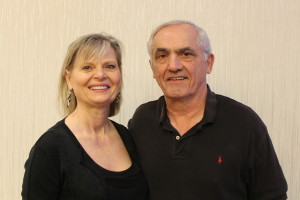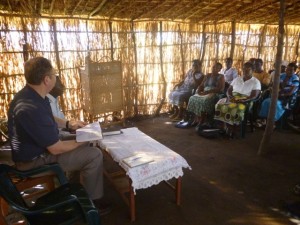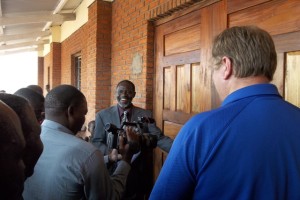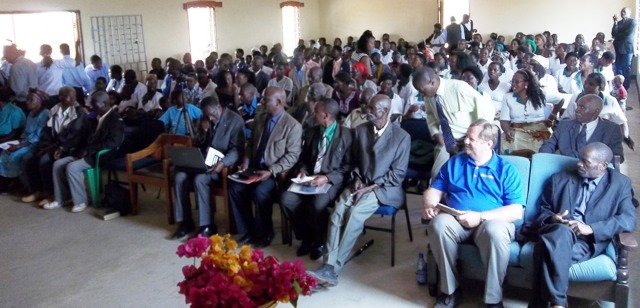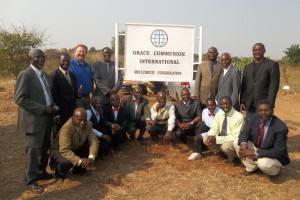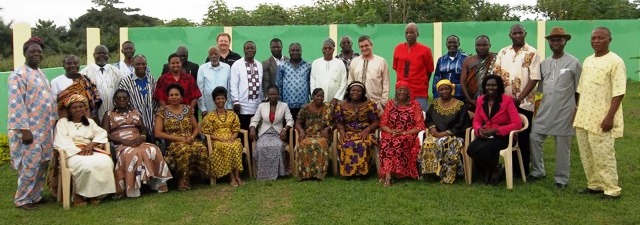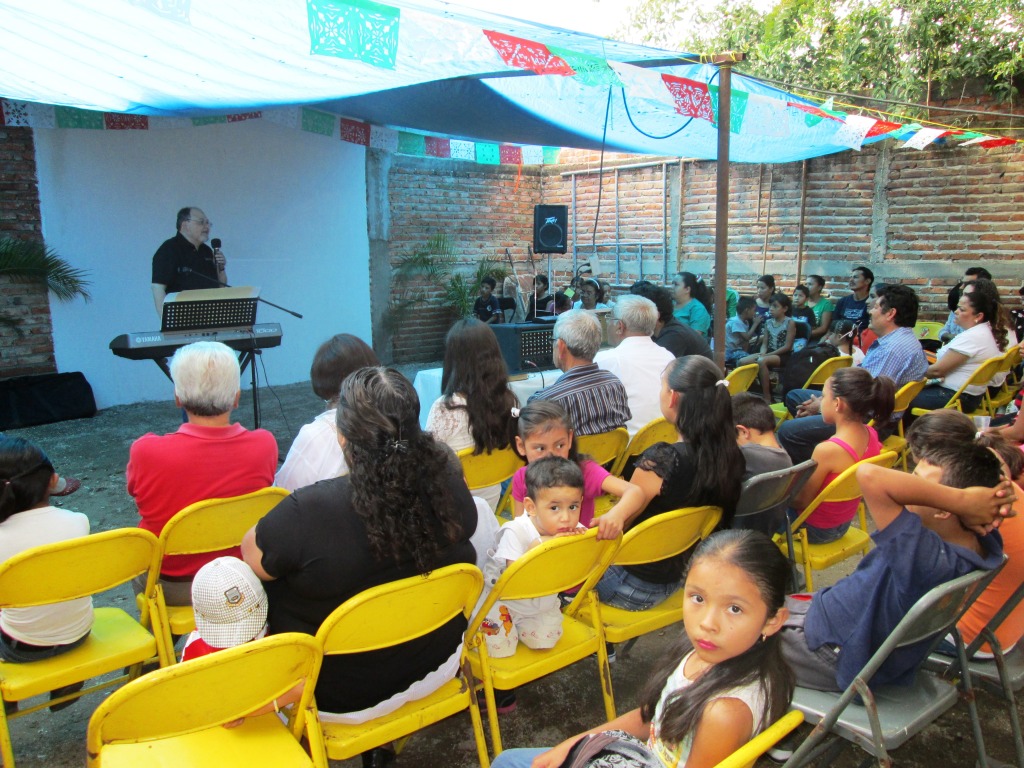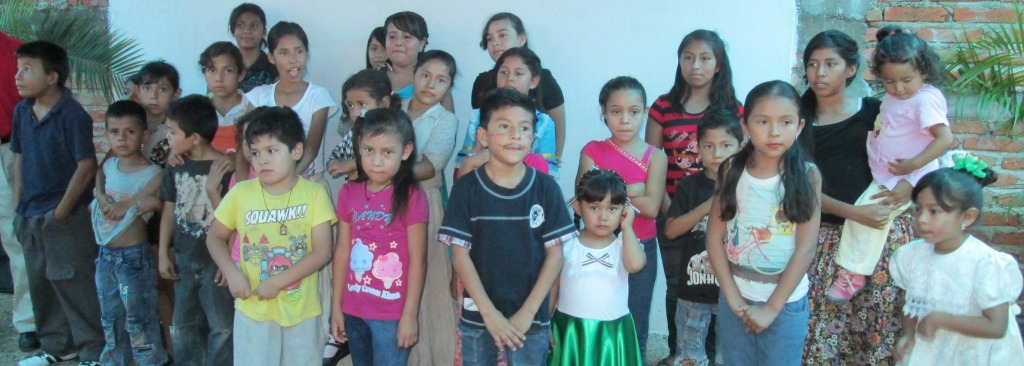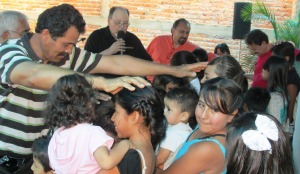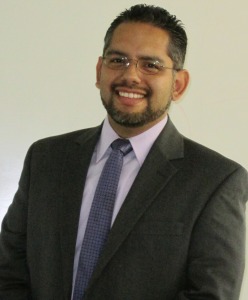In an essay entitled “Guidelines to an Understanding of the Person and Work of the Holy Spirit,” Dr. Gary Deddo offers an incarnational, Trinitarian perspective on the doctrine of the Holy Spirit. Over the next several weeks we’ll publish his essay serially in seven parts. Here is part one (to read other parts, click a number: 2, 3, 4, 5, 6, 7).
Introduction
Seeking to understand and know the Holy Spirit is a wonderful and rewarding endeavor. It ties in with every aspect of the Christian faith and life. But if ever there was a topic we are likely never to get to the bottom of, this one would qualify. The very name of this Divine Person, the Holy Spirit, already tells us that we’re in pretty deep. But we do have a good amount of insight given to us by biblical revelation that can inform our understanding and help us stay away from pure speculation. God has seen fit to reveal himself to us as Father, Son and Holy Spirit and has provided and preserved teaching about the Holy Spirit. Because he wants us to know, trust and worship him, we by faith can dare to pursue understanding on that basis. But we proceed only by God’s grace.
In this essay, however, we will only touch on a few key points that address questions that are, first, foundational to our faith in the Holy Spirit and, second, are of more immediate importance given current discussions and debates. It is our prayer that this essay will also help keep further explorations and other discussions in perspective. It is not possible in a short space to offer anything near a comprehensive view, so regard this as more of a beginning than an ending.
Jesus instructs Nicodemus
I’d like to start with our recalling a passage from the Gospel of John. I’m referring to the story of Nicodemus. Jesus is speaking to Nicodemus, trying to explain to him something foundational regarding the nature and work of the Spirit. Jesus says to him, “Very truly I tell you, no one can enter the kingdom of God unless they are born of water and the Spirit.” He continues, “Flesh gives birth to flesh, but the Spirit gives birth to spirit. You should not be surprised at my saying, ‘You must be born again.’ The wind blows wherever it pleases. You hear its sound, but you cannot tell where it comes from or where it is going. So it is with everyone born of the Spirit” (John 3:5-8).
Nicodemus wants to understand how God works. Jesus tells him how God works with us is by the Holy Spirit. But Nicodemus is not exactly satisfied with that answer. He wants to know, if he can, how then the Spirit works! Jesus’ answer to that “how” question amounts to his saying: How the Spirit works is like trying to talk about how the wind works. We see the effects, but we know very little about it, not even where it was a few moments ago or where it will end up going a few moments later! The Spirit is not predictable or controllable by us. We don’t and can’t have an answer as to how the Spirit works, the mechanics of it. Apparently the “how” question is the wrong one to ask. And, given Jesus’ reply to Nicodemus, we can assume that it’s not necessary for us to know either, even to receive the benefits of the working of the Spirit!
Jesus’ “no-explanation” answer does makes sense. How can we possibly put into words, concepts and ideas something about the Spirit given that it is like the wind? You can’t actually predict its movement or say much about it except that “it blows where it wills.” The Spirit has a mind of his own! I think that’s part of our experience. The wind of the Spirit blows where it wills. We did not necessarily see it coming and don’t necessarily see exactly where it’s going. So it is with the Spirit.
Focus on the biblical teaching
So why not just stop right there? Well, in some cases I think that might be the right thing to do. There is a lot of speculation taking place, especially about how the Spirit works. However, we are given other words and descriptions in biblical revelation that refer to the Holy Spirit. But not surprisingly, they don’t tell us how the Spirit works nor especially how to bring the Spirit under our control or how we can influence or predict the working of the Spirit. Rather, most of what we are given relates to the nature and purpose and character of the Spirit, not the mechanics of his working. All sorts of problems can be avoided if we simply pay attention to what biblical revelation actually tells us and resist using what we discover in ways that disregard Jesus’ own teaching on the limits of our knowledge of the Holy Spirit’s wind-like working.
Sometimes, people think the Holy Spirit gets less attention than deserved—the short end of the stick, as we say, or short shrift. The complaint that the Spirit is under-represented can be heard both at the levels of theological discussion as well as at the daily and practical level of church life. That’s a perfectly good concern to raise. We should be aware and take to heart all we are told regarding the Spirit. Neglecting any part of biblical witness is not a good idea. Faith seeks whatever understanding of the Spirit we are given, as in any other part of the Christian faith. But we can ask the counter question as well: Is it true that in practice and preaching we don’t properly emphasize the Holy Spirit? If so, in what ways do we fail to give the Spirit sufficient attention? And, what measure or criteria can we use to evaluate whether or not we have under- (or over-) emphasized the Holy Spirit?
Whether or not we give full attention is best gauged by the norm of biblical teaching. We can look to Scripture to weigh its own emphasis on the Spirit relative to other matters. We can also consider the full range of insights it presents us. Then we can compare our own emphasis and range of teaching to the pattern and proportion found there. While we will not be able to conclude with something like a numerical measurement, I think there will be many indicators in biblical teaching that can greatly assist us in our process of discernment. We can also borrow understanding on this matter from teachers of the church down through the ages, including our present time, as it seems in alignment with biblical revelation considered as a whole.
If there is some kind of deficit, then we’ll also need to explore how best to correct that lack. We’ll need to discern this issue as well, because there are various ways to correct for it. But some are not as useful or faithful as others. And some purported correctives promoted in recent times have seemed not only speculative but harmful to the health of the Body of Christ. What the Bible teaches can help us discern how best to make any kind of corrective action called for.
What are the basics of revelation about the Holy Spirit?
Recall that any theology built on biblical revelation must seek first and foremost to answer the question of “who” the God of the Bible is, for that is its central concern and controlling topic of the whole Bible. Biblical revelation is not geared nearly as much to answer the questions of how or why, where or when. So our understanding must also begin by seeking to know first who the Holy Spirit is.
Let’s begin with a review of the most basic truths we have been given about the Holy Spirit. Most fundamentally we are told about the Spirit’s relationship with the Father and the Son. Those relationships identify who the Spirit of God is. Who is the Spirit? The Spirit is the Spirit of the Father and the Son. The Spirit is one with the Father and one with the Son. Jesus is conceived by the Spirit, he has the Spirit for us and he ministers in and by the Spirit even in his atoning work on the cross. Jesus and the Father send the Spirit to us. The Spirit takes us to the Father through the Son. By the Spirit we are united to Christ so that we share in his life, life in fellowship and communion with the Father. And we share, by the Spirit, in Jesus’ ongoing ministry in the church and in the world.
Notice that what Jesus teaches Nicodemus (and us) fits the overall pattern of revelation about the Spirit throughout Scripture. Nicodemus wanted to know how one can be “born again” (or it could be translated, “born from above”). But Jesus’ response indicates that such “how” questions can’t really be answered in connection with the Spirit! Nicodemus is not told how the Spirit blows to bring us new life. Rather, Jesus’ answer to his “how” question identifies the “Who” behind the “how.” But Jesus does describe in a comprehensive way the effect of the working of the Spirit, namely, bringing us a new kind of life that comes from God. The Gospel of John goes on to shed even more light on the relationship of the Spirit to Jesus and to the Father, which includes the inter-relationship of their missions and ministries. These relationships are especially prominent in chapters 13-17. The central concern throughout this Gospel remains their conjoint relationships. They are inseparable, always being together and always working together.
One in being—united in act
Borrowing now from the more developed doctrine of the Trinity, we can say in summary that the three Divine Persons of the Trinity are “one in being.” This technical phrase helps us to remember there are not three Gods, but only one. So, the Spirit is not a separate God that has his own independent mind, his own action, his own plan, and his own purpose. The Spirit is joined in one being and therefore joined in one mind, action, plan and purpose with the Father and the Son. Even the name, “Holy Spirit,” indicates to us the unity of the Spirit with Father and Son, since only God has the name “Holy.”
The point here is not to let our minds think about the Holy Spirit as an independent operator. That’s one of the biggest mistakes that we can make. Always remember, whatever the Spirit does, wherever the Spirit is at work, that Spirit is the Spirit of the Father and the Son, because they are one in being. They do not act separately, apart from one another. They act out of one shared mind, heart and purpose in unity with each other. St. Augustine famously summarized this in the fourth century: “All the works of God are inseparable.”
A number of special phrases have been used down through the ages to convey the oneness or unity of the Persons besides saying that they are “one in being.” They are said to “co-exist.” They “co-inhere” in one another. They “in-exist” one another or they “mutually in-dwell” one another, they “co-envelop” one another or they “mutually interpenetrate” each other. Their oneness of being has been expressed by saying that the whole God is present in each of the Divine Persons. The whole God is present in the Father. The whole God is present in the Son. The whole God is present in the Spirit. That’s all to say: they’re one in being even though they’re distinguishable, we say, in person. An early creed sums it up this way: the Triune God is a Unity in Trinity and a Trinity in Unity.
Sharing all divine attributes
This means that the Holy Spirit is fully and completely divine and has from all eternity all the attributes that the Father and the Son have. The Spirit is not subordinate or less than the others. All that you can say of the Father, such as being omniscient, holy, omnipotent, eternal, and even being a Creator, can all be said of the Spirit (and can all be said of the Son). Dividing up among the Persons the attributes of God and the actions of God towards creation is ruled out because they are one in being.
That’s a hard rule for us to follow because we have developed poor habits of thinking and speaking in the church and likely were never taught otherwise. We also like to divide things up and align certain attributes or actions with the Father and others with the Son or the Holy Spirit. A typical way we do this is by saying the Father creates, the Son redeems and the Spirit perfects or sanctifies. We might think the Father is just and holy in comparison to the Son, who is merciful and gracious. But taking such a division of labor in a strict way would be an inaccurate, even misleading way to speak of God. The distinct Persons of the Trinity do not have separate jobs or wear different hats or play different roles that they accomplish by themselves. God acts as the one being that God is. His being does not fragment in mind, will, purpose or in action.
So, to repeat, everything you can say about the eternal nature and character of the Father, you can say about the Son and you can say about the Holy Spirit. They are each all-powerful, omniscient, omnipresent, eternal, good, merciful, righteous and holy. They are all to be worshiped together because they’re one in being. So we can say of our worship—we worship the Father through the Son and in the Spirit. Or, we pray to the Father, through the Son and in the Spirit. And we proclaim that the Father has redeemed us through the Son and in the Spirit. The whole God is our Savior!
The unity of the being (and therefore of the action, character and attributes of God) is one of the most fundamental things to hold on to and to watch out for when we go on to say other things about the Spirit. We want to avoid talking as if the Divine Persons are separate, wear different hats, have divergent purposes or as if they’re operating independently of one another. Simply remembering they’re one in being will prevent a lot of problems down the theological road.
Next time we’ll look at some of the distinctions in the united acts of the Father, Son and Spirit.
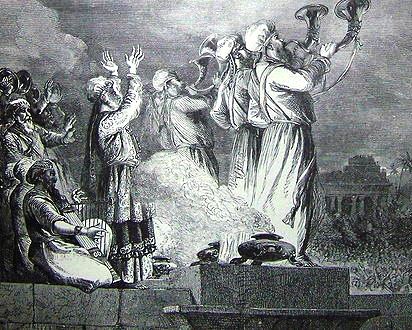 Ancient Israel initially used ram’s horns for their trumpets, but by the time of Numbers chapter 10, trumpets were typically made of silver. The use of trumpets is mentioned 72 times in the Old Testament. They were sounded for various reasons: to announce national crisis, to call the nation to solemn assembly, to make announcements, and as a call to worship. In time of war, trumpets instructed soldiers as to how to prepare for and then proceed into battle. Trumpets also announced the arrival of the king.
Ancient Israel initially used ram’s horns for their trumpets, but by the time of Numbers chapter 10, trumpets were typically made of silver. The use of trumpets is mentioned 72 times in the Old Testament. They were sounded for various reasons: to announce national crisis, to call the nation to solemn assembly, to make announcements, and as a call to worship. In time of war, trumpets instructed soldiers as to how to prepare for and then proceed into battle. Trumpets also announced the arrival of the king.

